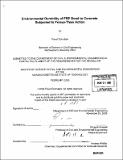Environmental durability of FRP bond to concrete subjected to freeze-thaw action
Author(s)
Dohnálek, Pavel
DownloadFull printable version (19.72Mb)
Alternative title
Environmental durability of fiber-reinforced plastic bond to concrete subjected to freeze-thaw action
Other Contributors
Massachusetts Institute of Technology. Dept. of Civil and Environmental Engineering.
Advisor
Eduardo Kausel.
Terms of use
Metadata
Show full item recordAbstract
An experimental study was performed to determine the environmental durability of the adhesive bond between fiber-reinforced plastic (FRP) and concrete. The study specifically focused on freeze-thaw cycling exposure of such bonds and their ultimate strength prior and after the environmental exposure. To investigate the bond strength 84 single lap shear specimens were manufactured utilizing two different types of carbon FRP pultrued strips and three different structural adhesives for total of three FRP/adhesive combinations. Two types of concrete substrate were used: regular high strength and air-entrained concrete. The specimens were freeze-thaw cycled for three different numbers of cycles using two different freeze-thaw procedures. First freeze-thaw procedure used chloride solution (3% NaCI) as its medium; the second procedure utilized tap water. This main program was complemented by the same freeze-thaw cycling of pull-off specimens of the adhesively bonded system and dumbbell tension specimens of the three adhesives. Coefficients of thermal expansion of the three structural adhesives were also experimentally measured. Results show that the ultimate strength of the adhesive bond between FRP and concrete deteriorates measurably during freeze-thaw cycling in chloride solution. This must be put into perspective as the concrete itself severely deteriorates during this type of freeze-thaw cycling. Therefore, the durability of the adhesive bond between FRP and concrete is dependent on the durability of the concrete. (cont.) This is also supported by the results of testing of the adhesive tensile specimens that did not show decrease in strength only an increase in ultimate strain. The freeze-thaw cycling in water did not result in any deterioration of the specimens' strength, most specimens actually acquired higher strength, due to moist curing of the concrete during the freeze-thaw cycling.
Description
Thesis (S.M.)--Massachusetts Institute of Technology, Dept. of Civil and Environmental Engineering, 2006. Includes bibliographical references (leaves 46-49).
Date issued
2006Department
Massachusetts Institute of Technology. Department of Civil and Environmental EngineeringPublisher
Massachusetts Institute of Technology
Keywords
Civil and Environmental Engineering.